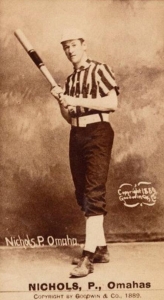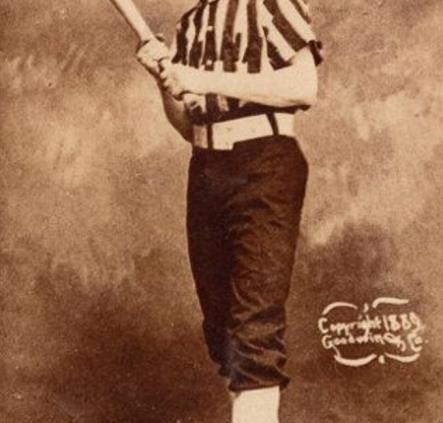July 22, 1893: Tucker ‘hit like a fiend’ and Nichols ‘saved the day’
 The victory this day brought the Beaneaters to within a half-game of first place, just behind the Phillies. The Giants were in 10th place in the 12-team National League, 14½ games out of the lead. Though still in July, the game was the last matchup between the two teams in the 1893 championship season.
The victory this day brought the Beaneaters to within a half-game of first place, just behind the Phillies. The Giants were in 10th place in the 12-team National League, 14½ games out of the lead. Though still in July, the game was the last matchup between the two teams in the 1893 championship season.
The Saturday afternoon game pitted two future Hall of Famers against each other, Kid Nichols for Boston and Amos Rusie for New York. Nichols was working his way toward a 34-14 season. Rusie wrapped up 1893 with a 33-21 record. But neither of them had started the game.
Pitching first for Boston was Harry Staley, who ultimately finished the season 18-10 despite a 5.13 earned-run average. He gave up two runs to the Giants in the top of the first. Center fielder Jack Doyle started things off with a single to left field off Staley. He was forced at second. After another out, third baseman George Davis posted his first of five hits in the game, driving in Giants manager and second baseman Monte Ward. Roger Connor singled home Ward and the Giants had a quick 2-0 lead.
Mark Baldwin had beaten Boston and Nichols, 4-1, on July 17. He’d beaten Boston again, 11-3, over Harry Staley in the second game of the July 19 doubleheader. This day he did not fare as well. He gave up seven runs in the bottom of the first inning. Herman Long walked and Bobby Lowe singled. Hugh Duffy sacrificed but was safe on an error and the bases were loaded with nobody out. Tommy McCarthy singled in two, to tie the score. Tommy Tucker and Charlie Ganzel both singled, and Staley doubled, and it was 7-2, Boston, after the first frame.
This prompted Boston super-crank Arthur “Hi-Hi” Dixwell to crow, making things “very disagreeable” for New York’s lead rooter, “big fat Judge Cullom.”1
After the first inning, Rusie took over for Baldwin.
This was no routine game in midseason. As T.H. Murnane wrote in the Boston Globe, “There were no smiles exchanged and the members of both teams played as if the pennant was at stake and this game would decide it.”2 The heat and humidity was fierce; a front-page lead story on the weather in the next day’s Sunday Globe described an “over-baked and blistered city.”3
Some 5,296 spectators made their way to the South End Grounds. It was, Murnane wrote, “large and the most enthusiastic of the season.” After Umpire John Gaffney gave the word, the battle began. The crowd was not uniformly one of backers of the Beaneaters. Murnane observed that “at least one-third of the spectators … cheered the New York boys at every chance.”4
New York scored twice more in the third, and Boston added one to their score, making it 8-4 – but the New Yorkers scored four times to tie it in the top of the fourth. Cullom stood from behind the visitors bench and yelled and yelled until Dixwell waved that the battle was on.
The Boston Journal wrote that “the man who did not have his fill of ecstasy and despair in quick alternation had no blood in his veins.”5
The Beaneaters pushed two more runs across in the bottom of the fourth, and never looked back. That’s when manager Frank Selee brought Nichols on. The Philadelphia Inquirer game story declared, “Nichols Saved the Day.”6
Nichols shut down New York, allowing only Davis to reach base – twice: once on an infield single to third base and once on a single to left field in the top of the ninth.
“Rusie was hit hard at times and his support was poor,” reported the New York Times.7 The Beaneaters added another run in the fifth and two more in the eighth, and the final score was 13-8 in Boston’s favor.
Davis was 5-for-5 on the day. For Boston, Murnane wrote, “Tucker hit like a fiend,” going 4-for-5, and Ganzel was 3-for-3 at the plate.
Murnane devoted a full paragraph to praising the officiating of umpire Gaffney, saying that it was a “pleasure” to see such a well-umpired game.
The game lasted, according to the box scores, exactly two hours. In the matter of doubles, some box scores – such as the ones that ran in the Inquirer and the New York Times – show Tucker as having four doubles in the game. The hometown Boston Globe, however, showed him with just two.
Boston won the season series between the two clubs, eight games to four. The Beaneaters finished in first place, five games ahead of second-place Pittsburgh. The Giants climbed in the standings, while falling further out of first. They finished in fifth place, but were 19½ games behind Boston. So many other teams had simply performed worse, dropping further in the standings.
Sources
In addition to the sources cited in the Notes, the author also consulted Retrosheet.org.
Notes
1 T.H. Murnane, “Coming Our Way,” Boston Globe, July 23, 1893: 7. Digby Bell and Sam Crane joined Cullom in pulling for the Giants.
2 Ibid.
3 “Not a Hot City,” Boston Globe, July 23, 1893: 1.
4 Ibid.
5 “A Game for Cranks,” Boston Journal, July 24, 1893: 5.
6 “Nichols Saved the Day,” Philadelphia Inquirer, July 23, 1893: 3.
7 “New-Yorks Sadly Trounced,” New York Times, July 23, 1893: 6.
Additional Stats
Boston Beaneaters 13
New York Giants 8
South End Grounds
Boston, MA
Corrections? Additions?
If you can help us improve this game story, contact us.


